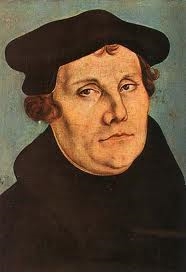Today, we marvel at how quickly revolutions form. The so-called Arab Spring exploded though the use of modern technology and social networking. The world is different than it was only a year ago. We have seen similar stirrings in Russia over the “reelection” of Putin to the Russian Presidency.
But what is happening before our eyes in 2011-2012 is nothing new. As the author of Ecclesiastes reminds us:
What has been will be again,
what has been done will be done again;
there is nothing new under the sun. (Eccl. 1:9)
 Nearly five hundred years ago, on October 31st, 1517, an obscure Roman Catholic monk nailed his 95 Theses on the Power and Efficacy of Indulgences to the church door in Wittenberg. Centuries before text messaging, the internet, or even electricity, Martin Luther’s words went viral, carried by the information highway of the day–Gutenberg’s printing press. But not by that channel only. Luther’s ideas were also spread by a generation of balladeers, artists, musicians, songwriters, and cartoonists. These passionate communicators shook Europe to the core and triggered a re-formation of culture that shaped the West and continues to influence the larger world to this day.
Nearly five hundred years ago, on October 31st, 1517, an obscure Roman Catholic monk nailed his 95 Theses on the Power and Efficacy of Indulgences to the church door in Wittenberg. Centuries before text messaging, the internet, or even electricity, Martin Luther’s words went viral, carried by the information highway of the day–Gutenberg’s printing press. But not by that channel only. Luther’s ideas were also spread by a generation of balladeers, artists, musicians, songwriters, and cartoonists. These passionate communicators shook Europe to the core and triggered a re-formation of culture that shaped the West and continues to influence the larger world to this day.
What do Martin Luther and the Arab Spring have in common? Read the thought provoking article in the Economist How Luther went Viral .
– Darrow Miller





